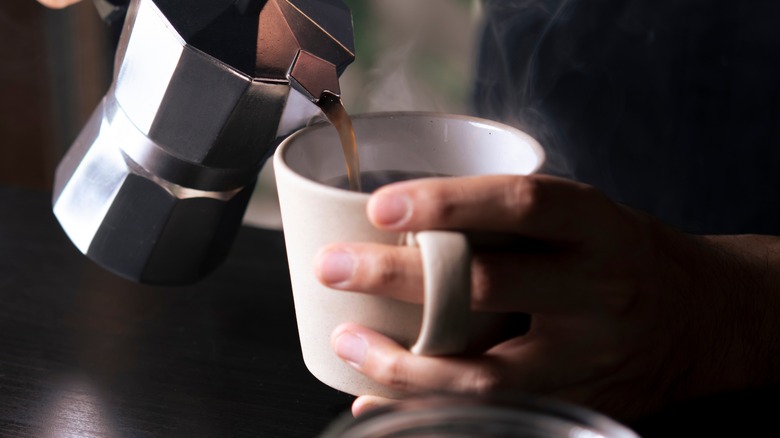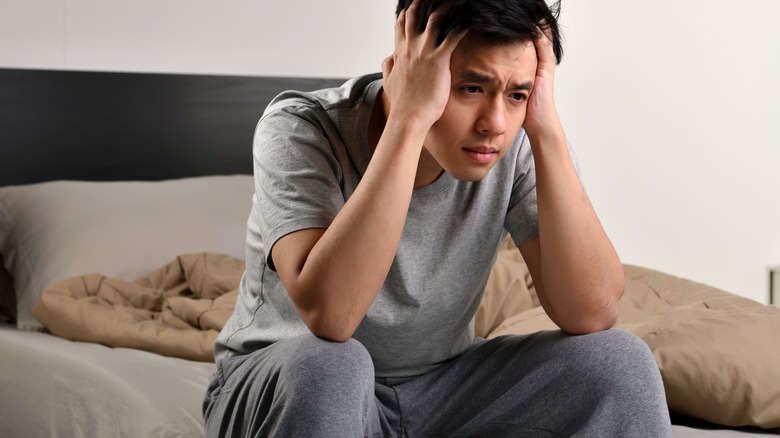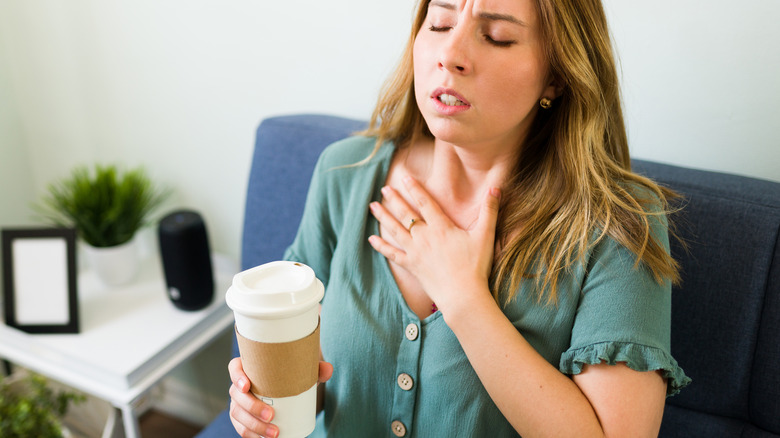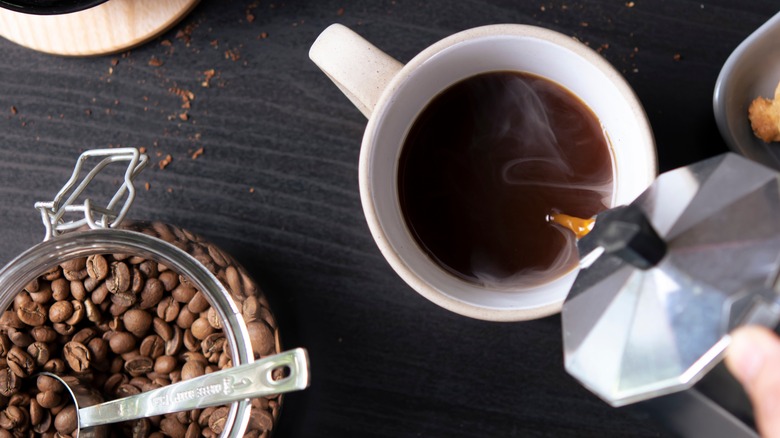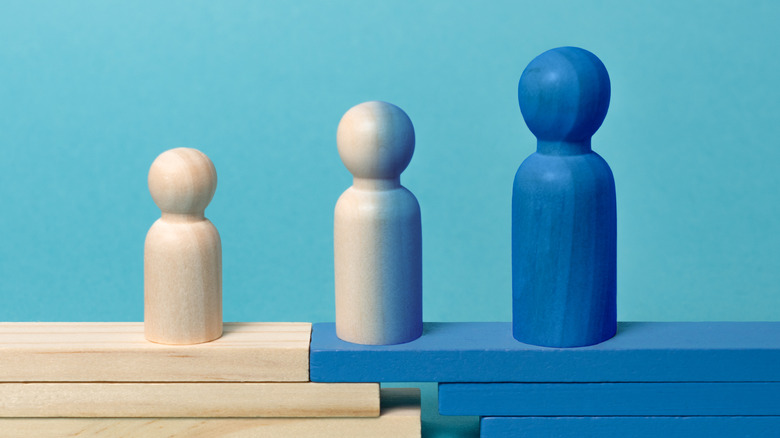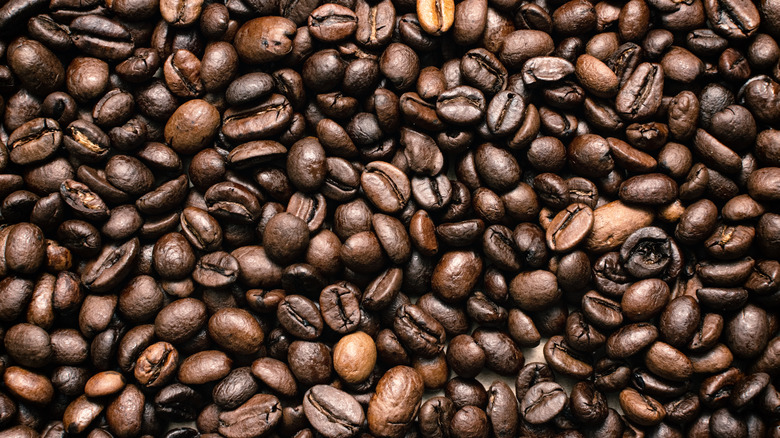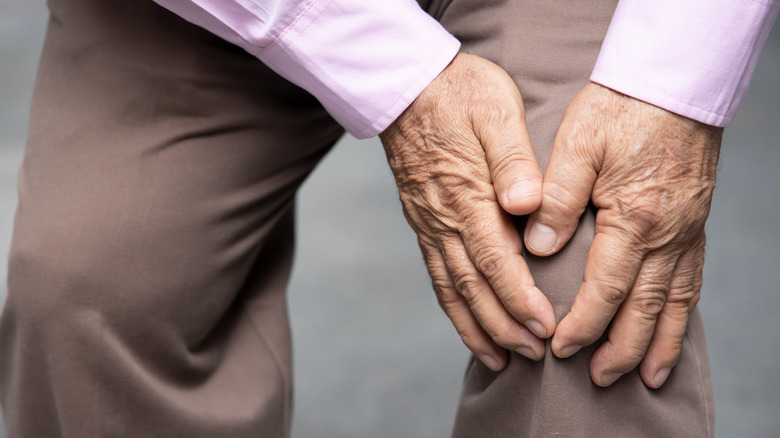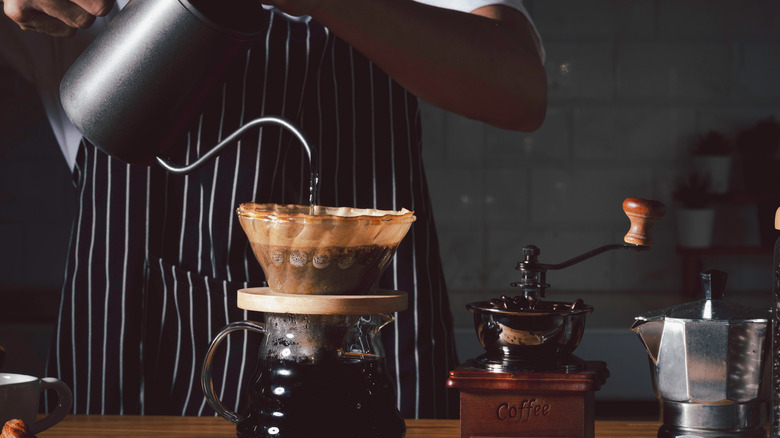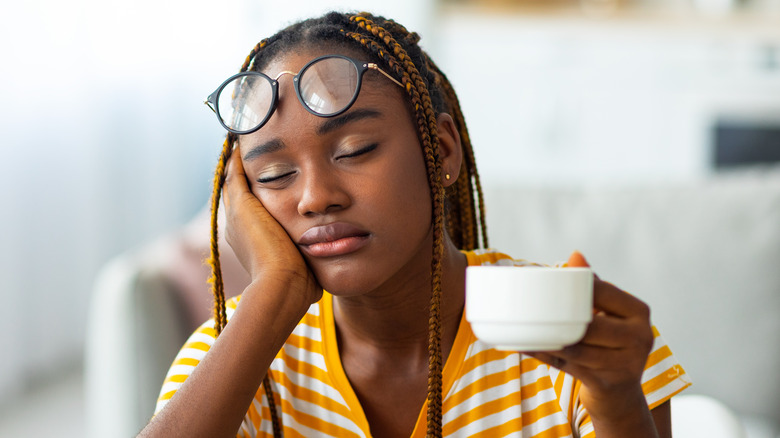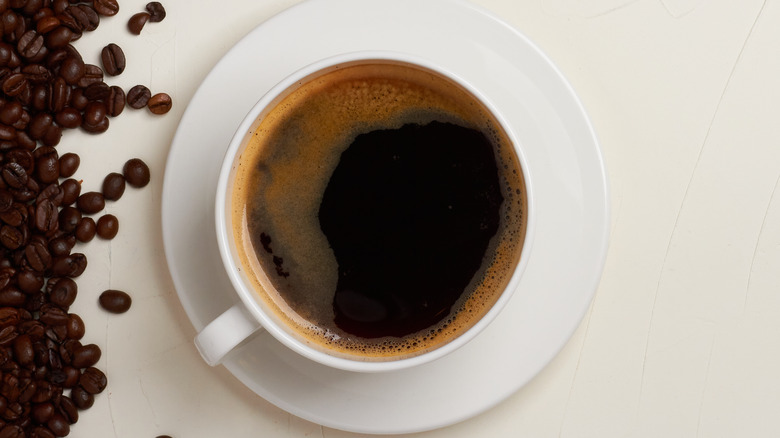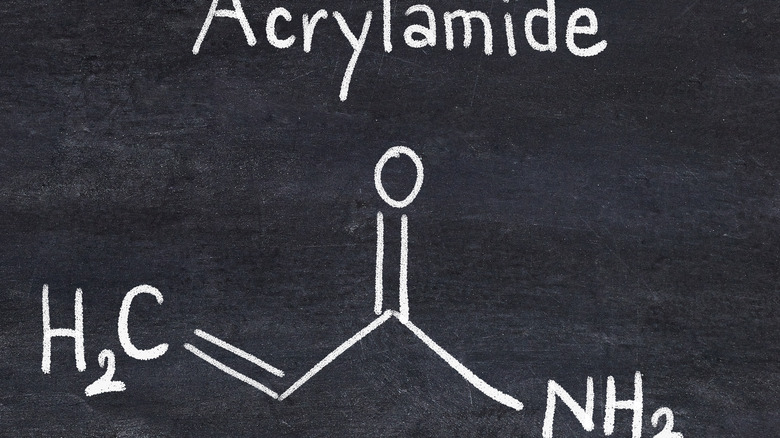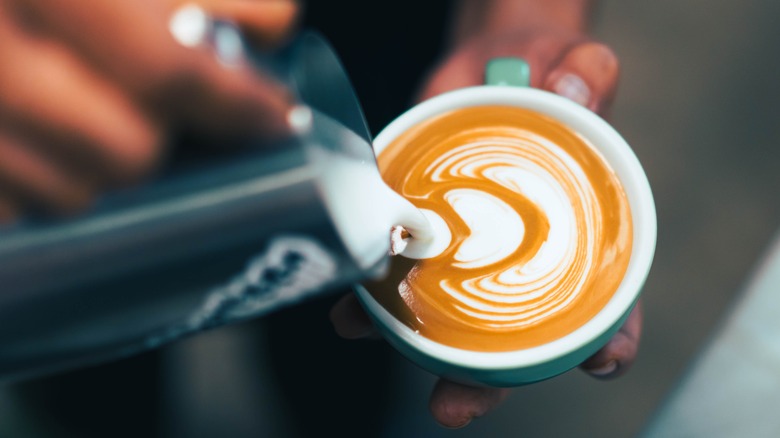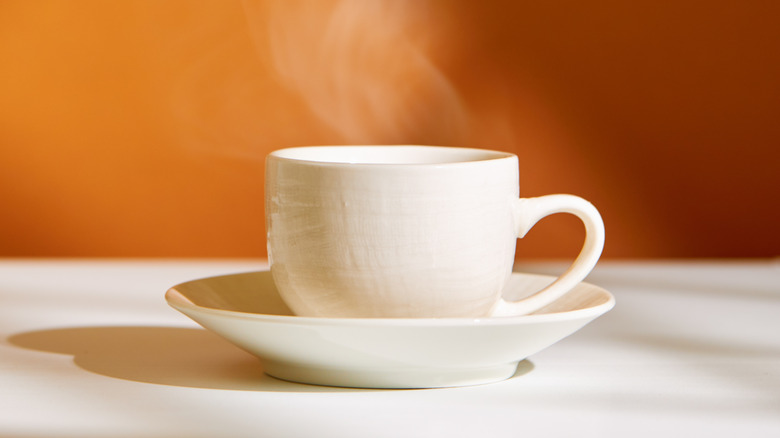Health Myths You Should Stop Believing About Coffee
Okay, guys, we're going to let you in on a little secret: We love coffee. Some of us can't start our days without it, some of us can't get through our days without it, and for some of us, it's a near-obsession. And this is reflected in the sheer amount of money some people spend on coffee, with over 10% of all Americans spending $40 or more on the drink in their own homes every month, with slightly more people spending the same amount or more in cafes monthly (per Statista). Indeed, our love affair with coffee remains strong.
And we can see why, too. Aside from the obvious great taste and clear stimulating benefits that people love, coffee is also pretty good for you in many ways, providing you with antioxidants that may reduce your risk of chronic conditions, as well as caffeine that increases your mental capacity (per SELF). But, with fame comes notoriety and rumors, and coffee's no more immune to that than your average celebrity. There's a swirl of negative health claims around coffee, some as old as time — but how many of them are true? As it turns out, not many. That's why we're here to debunk some popular myths about the morning drink.
Myth: Drinking coffee will cause insomnia
So here's the thing. We're obviously not going to deny that drinking coffee will wake you up. But, if you're drinking regular amounts of coffee and curtailing your intake long before bed, you shouldn't worry too much about it keeping you up all night.
It's certainly true that coffee has a stimulating effect, as it blocks the production of adenosine, a chemical that builds up throughout the day and is a large part of why we become sleepy (per the Sleep Foundation). But the caffeine in coffee also has a relatively short half-life, which ranges from 4-6 hours in most people, which means that most of its effects will be gone by the time you're trying to sleep.
As such, as long as you're drinking your coffee relatively early in the day, you should expect to be dreaming to your heart's content by nighttime. Make sure to drink your last coffee at least six hours before you plan to sleep, though, as drinking coffee closer to bedtime will likely mean quite a bit of tossing and turning for you. Also, if you find that you still can't sleep despite putting down your coffee cup six hours prior, try finishing your drink earlier next time.
Myth: Coffee is bad for your heart
Most people who have drunk a little too much coffee will be familiar with the disconcerting, heart-pumping feeling that can come with excess caffeine. And this can lead some people to assume that coffee is not that great for your heart. Luckily, this is generally untrue.
For most people, drinking a moderate amount of coffee (which usually equates to around 4 or 5 cups a day) will pose no risk to your heart health, according to dietitian Victoria Taylor (via the British Heart Foundation). Taylor does point out, however, that it's probably not good to ignore any symptoms that affect your heart when drinking coffee (like palpitations), and that it's wise to reduce your intake accordingly.
Interestingly, coffee may actually be good for your heart, as Johns Hopkins Medicine points out. Drinking coffee in smaller amounts, up to two cups a day, could boost your heart's ability to pump blood around your system, and thereby keep heart failure at bay. A study conducted by the American College of Cardiology found that when people drank 2-3 cups of coffee a day, they were less likely to develop cardiovascular disease or exhibit signs and symptoms of arrhythmia.
Myth: Coffee makes you dehydrated
How many times have you drunk a coffee, and then pretty soon after needed the bathroom? And how many times have you made the association that coffee is actually making you need to pee more, and potentially dehydrating you? If you're anything like us, you've done that a lot — but the good news is that it's probably not true.
It's certainly true that coffee contains caffeine, and that in higher doses, caffeine has a diuretic effect, causing you to pee more and potentially lose fluids (per Healthline). But the fact is, all of that fluid that makes up your coffee in the first place tends to negate any diuretic effect experienced. In fact, a study published in PLoS One found that when people drank coffee in moderate quantities, it proved to be as hydrating as water.
It's worth bearing in mind, however, that if you drink a large number of cups per day (five or more), the diuretic effect may start to kick in with more force, and it could start to dehydrate you a little.
Myth: Coffee stunts your growth
Myths about coffee stunting growth have been around for a while, and form part of parental strategies worldwide to keep their kids away from caffeine. But have faith, people: That coffee won't stop your kid from growing, it'll just make them really, really hyperactive.
There is no scientific evidence whatsoever that coffee, or caffeine, can stop people from growing, according to Harvard Health Publishing. This rumor could have originated to stop longstanding questions about coffee's effects on bone health and osteoporosis, which some people then took as proof, somewhat tenuously, of its growth-stunting effects. But the fact is that coffee has not been conclusively proven to cause osteoporosis in significant amounts, nor is osteoporosis a catalyst of stunted growth. Instead, a human's growth and eventual height are established by genetics, as well as their overall diet and lifestyle as they grow up.
It's far more important to focus on overall nutrition and living an active day-to-day existence for your younger ones than making them avoid coffee (although it's probably wise to limit it for them too, as you may have some overly excitable kids on your hands). Bear in mind, too, that by that same token, keeping coffee away from growing people won't necessarily make them taller.
Myth: Darker-roast coffees have more caffeine
Coffee blends and flavors seem to come in as many different types as there are days in the year, and many out there prefer the robust, full-bodied taste of dark-roast coffee. But as the flavor of a dark roast is richer and stronger, it can often lead people to assume that the coffee's going to be more stimulating.
However, this isn't the case at all. Whether your coffee is dark-roast or light-roast, it'll generally have the same caffeine content across the board, according to experts at Kicking Horse Coffee. Roasts aren't distinguished by the amount of caffeine they have in them, but rather by how long the beans are roasted — and the subsequent difference in flavor that occurs as a result. It might even surprise you to find out that lighter-roast coffees have marginally more caffeine in them, as the beans are slightly smaller and more tightly packed than their dark-roast siblings. Who knew?
Therefore, if you're worried that dark-roast coffee is going to blow you through the roof, never fear. The only thing that will make it stronger is if you add more coffee granules into your machine or press.
Myth: Coffee causes osteoporosis
Amongst the health myths that plague coffee, the claim that it causes osteoporosis stands tall above all others. The truth of the matter, however, still appears to be up for debate.
Certain studies and research cases have found that there is a link between drinking caffeine and how our bodies process and absorb calcium, which could therefore have negative implications on our bone health and heighten the risk of osteoporosis, as Medical News Today discusses. One study published in the Journal of Nutrition found that when postmenopausal women drank coffee in higher quantities, they did appear to lose additional calcium.
The specific links between this effect and osteoporosis, however, remain unclear, and further research needs to be completed to determine exactly how much coffee impacts bone health. Indeed, the Journal of Nutrition study also stated that women who drank moderate amounts of coffee per day (1-2 cups) exhibited little effect on their calcium balance, suggesting that a smaller intake of coffee could have less of an impact. If you're at all concerned about your bone health and you're drinking huge amounts of coffee daily, it could be worth assessing this — but it is far more important to follow a diet rich in calcium and vitamin D, and consume coffee (like everything else) in moderation.
Myth: Coffee will help you lose weight fast
Somewhere along the line, coffee developed a reputation as a drink that could assist in weight loss. And indeed, it's certainly true that it has been observed to have some fruitful effects when it comes to body composition. "Coffee increases metabolism because its main component, caffeine, is a stimulant that enhances your metabolic thermogenesis, which is the process by which the body generates heat from digested food substances," states molecular biology medical researcher Daniel Boyer (via Everyday Health). A faster metabolism equals more calories burned. Coffee may also serve to reduce appetite, causing folks to eat less.
But if all this sounds a bit too good to be true, it's because it is. While these effects have been observed in scientific studies, more research needs to be conducted to conclude exactly how beneficial coffee is. Furthermore, Boyer advises that coffee's effects on weight are pretty minimal, so it certainly won't act as a miracle foodstuff when it comes to weight loss. Instead, focus on eating a healthy, nutritious diet and developing an active lifestyle.
Myth: Coffee will get rid of your hangover
When you wake up with a pounding headache after a fun night of drinking and a few hours of sleep, wondering how on earth you're going to drag yourself out of bed, reaching for a coffee might be the first thing on your mind. But if you're hoping that cup of Joe is going to cure what ails you, we've got some bad news for you: Coffee isn't actually that helpful when it comes to dealing with a hangover.
While coffee might give you a useful jolt of energy to start to shake off the night before, beyond that, it's unlikely to provide any significant benefits, as Medical News Today points out. In fact, drinking a lot of coffee on a hangover could even create additional problems, due to excess caffeine contributing to hangover symptoms. Drinking large amounts of coffee can also have a slight diuretic effect, which is the last thing you want on a hangover, given that they're predominantly caused by dehydration.
The best thing for your hangover, apart from a bout of serious reflection on just how much you drank the night before, is pretty simple: Water, and lots of it, accompanied by wholesome, nutritious food, and a quick journey back to bed for some rest. Sorry, folks. No miracles here.
Myth: Pregnant people can't drink any coffee
Pregnancy is a time of enormous change, and with that comes reassessing your dietary habits. But if you've ever heard the oft-repeated statement that "pregnant people can't drink coffee," we're here to put that claim to bed, once and for all.
It's not that you can't drink any coffee when you're pregnant; rather, you may need to drink slightly less, per the Cleveland Clinic. The recommended maximum intake of caffeine is approximately 200 milligrams per day, and according to Ob/Gyn Monica Svets, the average cup of brewed coffee contains just under 140 milligrams. "So, if you have just one cup of brewed coffee a day, you should be fine."
But what about if you're breastfeeding? Well, folks, the good news is, you're still able to drink coffee during that period too — but as with when you're pregnant, it's advised that you limit your intake. You'll want to consume less than 300 milligrams daily if you're breastfeeding, as any more than that may limit the amount of iron in your breast milk (per WebMD). That means that you may be able to drink several cups a day and still be fine. Still, check with your doctor if you have any concerns.
Myth: Coffee will sober you up
Okay. So you've had an unexpectedly indulgent meal and a little too much to drink. No judgment, people, we've all been there. But whether it's because you urgently need to get back to work or you just want to ease the effects of alcohol a little, you might be thinking of grabbing some coffee to sober up. Unfortunately, you won't find much salvation in that cup.
While commonly used as a sobering-up technique, drinking coffee will not affect how drunk you are, as the CDC discusses. When you drink alcohol, it leaves your system by being metabolized by the liver, and coffee does nothing to speed up this process — which means that even if you feel more sober and alert, you still have the same amount of alcohol in your blood.
In fact, drinking coffee alongside alcohol could be pretty risky. Because of the increased presence of mind people might feel when consuming caffeine with alcohol, it can trick them into thinking they have sobered up, and therefore end up drinking way more than they should. This can lead to an increased likelihood of binge drinking, as well as potential harm or trouble due to alcohol consumption (like thinking they're sober enough to drive, for instance).
Myth: Decaf coffee is caffeine-free
So you've sworn off caffeine, you've endured the days of lethargy and headaches, and you've come out the other side, feeling fresh and ready to take on the world, stimulant-free. We salute you! And if you're still craving that coffee taste, you might be leaning toward decaf versions, in a bid to still enjoy the flavors and aromas without feeling buzzed. However, if you've gone caffeine-free, don't be lulled into thinking decaf coffee is completely innocent: It's not.
Contrary to popular belief, decaf coffee does have caffeine in it, albeit in much smaller amounts. The average decaf coffee contains roughly 7 milligrams of the stimulant (per Healthline). Now, granted, this may not seem like much, and a lot of people won't notice any effects of that amount of caffeine in their system. But it can still present issues in certain situations. People who have caffeine sensitivities or are avoiding caffeine due to kidney disease or anxiety should be wary of ingesting even smaller amounts of it, due to potential negative effects. And bear in mind that if you're drinking a lot of decaf coffee, the caffeine levels in your system could start to creep up, and you may begin to feel some of its effects (which negates the point of drinking decaf in the first place).
Myth: Certain substances in coffee can be harmful
While the health benefits of coffee are often widely touted, there are also numerous detractors of the drink. And one reason is because of the presence of acrylamide in the beverage (per Healthline). Acrylamide is a chemical compound that is created when coffee beans go through their roasting process, and can't be extracted from the grounds that you use to make your morning drink. Also used to treat wastewater and in the production of plastic products, acrylamide (in very high doses) has been found to increase the likelihood of nerve damage and cancer in some animals. Doesn't sound great, right?
However, before you throw all your coffee out, it's important to remember that it's pretty impossible to avoid acrylamide entirely. Plus, the amount that you drink in your coffee is unlikely to be harmful, with no studies finding a link between coffee consumption and cancer development. Coffee has been found to reduce the likelihood of developing certain cancers, with the risk of liver cancer noticeably lower in regular coffee drinkers, per research published in the journal Gastroenterology. You're far better off trying to reduce other potential sources of acrylamide, like inhaling secondhand smoke or eating burnt food.
Myth: Coffee contains the same amount of caffeine in every cup
If you're about to switch to a new coffee preparation method because you're excited to try that new cold brew technique (and you're assuming that your drink will give you the same effects), you may be seriously mistaken. Coffee's caffeine content can vary significantly from cup to cup, as Medical New Today points out, and this may be useful to know if you're trying to keep tabs on your caffeine intake.
Instant coffee will generally provide the lowest amount of caffeine per cup, with around 62 milligrams per serving, and brewed coffee usually contains roughly 80 to 100milligrams. The highest by a long shot when it comes to caffeine content, though, is cold brew: Due to its long-steeping process, cold brew servings could have as much as 238 milligrams of caffeine in them. Yikes. Prepare to be buzzed, people.
It's also worth remembering that different coffee chains can provide different caffeine levels in their coffees, even when their drinks are prepared in the same way. Take espressos from Dunkin' Donuts and Starbucks, for instance. A Starbucks espresso will deliver a pretty sizeable 150 milligrams of caffeine per espresso, while Dunkin' Donuts gives you 118 milligrams. Other drinks vary widely, too, due to a combination of different serving sizes and strengths of coffee.
Myth: Coffee is seriously addictive
Consuming coffee can put a lot of people on edge, and not just in the quite literal sense of feeling caffeinated. There are some out there who get nervous about drinking it because of its potential addictive effects. It is worth pointing out that there is some truth in this fear, as WebMD explains. The caffeine in coffee can create some degree of physical dependence, and this is well known by anyone who's tried to cut coffee out, with irritability, headaches, and tiredness being common symptoms of caffeine withdrawal.
However, there is a world of difference between the addictive qualities that caffeine presents and those of other substances. While you might crave your morning coffee, it's unlikely to create desires as strongly as some other drugs can. Nor is it as potentially disruptive to your life, relationships, and/or economic situation. If you're seriously struggling to go without coffee in any form, however, it's a good idea to contact your doctor to discuss how you might reduce your dependence on it.

